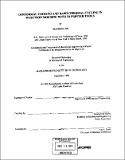Conformal cooling and rapid thermal cycling in injection molding with 3D printed tools
Author(s)
Xu, Xiaorong
DownloadFull printable version (18.80Mb)
Other Contributors
Massachusetts Institute of Technology. Dept. of Mechanical Engineering.
Advisor
Emanuel M. Sachs.
Terms of use
Metadata
Show full item recordAbstract
Solid Freeform Fabrication processes such as 30 Printing have demonstrated the potential to produce tools with complex internal geometry. This work explores the application of this capability to improved thermal management for injection molding tooling through: i)cooling lines which are conformal to the mold surface which provide improved uniformity and stability of mold temperature and ii) tools with low thermal inertia which, in combination with conformal fluid channels allow for rapid heating and cooling of tooling, thereby facilitating isothermal filling of the mold cavity. This work presents a systematic, modular, approach to the design of conformal cooling channels. Recognizing that the cooling is local to the surface of the tool, the tool is divided up into geometric regions and a channel system is designed for each region. Each channel system is itself modeled as composed of cooling elements, typically the region spanned by two channels. Six criteria are applied including; a transient heat transfer condition which dictates a maximum distance from mold surface to cooling channel, considerations of pressure and temperature drop along the flow channel and considerations of strength of the mold. These criteria are treated as constraints and successful designs are sought which define windows bounded by these constraints. The methodology is demonstrated in application to a complex core and cavity for injection molding. In the area of rapid thermal cycling, this work utilizes the design methods for conformal channels for the heating phases and adds analysis of the packing and cooling phases. A design is created which provides thermal isolation and accommodation of cyclic thermal stresses though an array of bendable support columns which support the molding portion of the tool where the heating/cooling channels are contained. Designed elasticity of the tool is used to aid in packing of the polymer during the cooling phase. Methodology for the design of this structure is presented. A set of tools has been fabricated and subjected to thermal and mechanical tests.
Description
Thesis (Ph.D.)--Massachusetts Institute of Technology, Dept. of Mechanical Engineering, 1999. Includes bibliographical references.
Date issued
1999Department
Massachusetts Institute of Technology. Department of Mechanical EngineeringPublisher
Massachusetts Institute of Technology
Keywords
Mechanical Engineering.